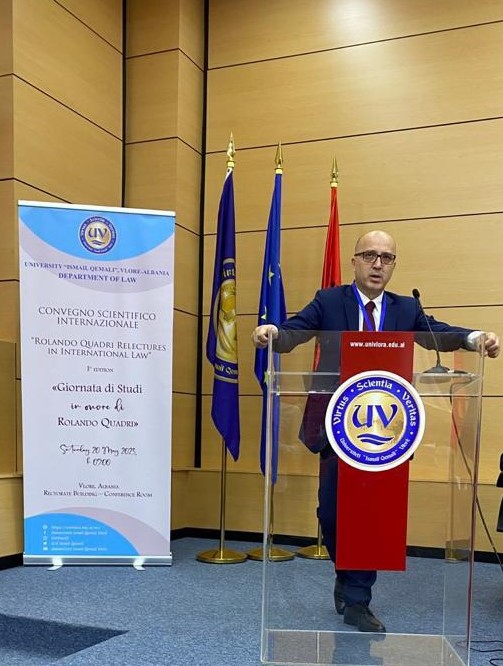Dear Deputy Rector Prof. Frosina Londo;
Dear Dean Prof. Armela Panajoti;
Dear Head of the Department Dr. Erjon Hitaj;
Dear Guests;
Ladies and Gentelmen,
I would like to congratulate the organizers of this conference on taking this initiative and also thank them for the invitation.
I personally believe that the organization of such conferences, as well as the discussion at the academic level, constitute an important process. The contribution of the academic world is absolutely valuable as it provokes a useful debate.
Providing a qualified professional opinion, based on the theoretical and practical experience of researchers, constitutes a key tool for a complete analysis of the current situation related to this conference topic. At the same time, this process of engaging and developing the qualified legal and political thought even in the context of international relations, serves as a mechanism for identifying problems and needs for improvement.
When I became acquainted with the program of this activity, the topics of discussion as well as the issues that will be addressed, the first thought that came to my mind was the skepticism that has accompanied the development of the international law since ancient times.
There are many skeptical authors such as philosophers, political scientists, lawyers or publicists who deny the character or feature of “positive law” to the international law, since states are sovereign and consequently, they can apply no other law. International law lacks the characteristics of “positive law”, but it should be considered only as a matter of ethics or international positive morality.
Meanwhile, the General Codification of International Law has not been realized yet, since it has a universal character and it is obvious that not all states can agree on all issues. The international community does not have a central body to make this codification possible, since sovereign states have not delegated the right to codify. Some researchers have considered it static and an obstacle to the development of international law. At the same time, the comparative aspect will always remain part of the discussions about norms, institutions and actors of international law. In this context, it is the states which have the right to codify and they do this through conferences or international meetings. This is the reason why I really do appreciate this conference.
Today, through this conference, we will develop and build a continuous dialogue and communication between us as academics and as legal professionals. Not only will we share our opinions within the framework of international law, but we will also share opinions on the values that unite us, on the relationship that each of us has with the law, on its universality, institutional structures and cooperation between individuals or states.
I hope that the organization of this conference in Albania today will be the starting point of building a tradition that will continue.
Albania is a beautiful and welcoming country.
Once again thank you for the invitation and I wish you all a great success for the conference!

